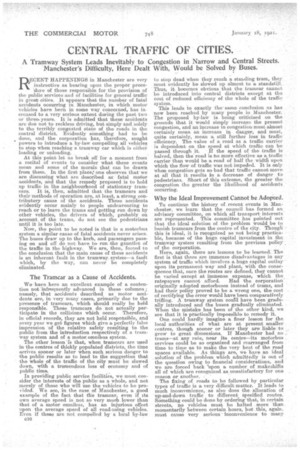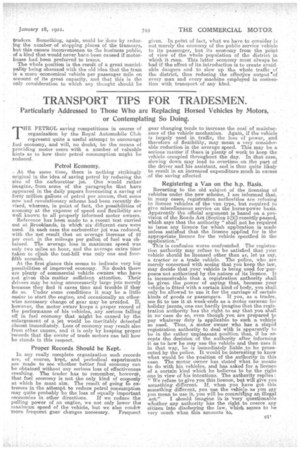CENTRAL TRAFFIC OF CITIES.
Page 14

Page 15

If you've noticed an error in this article please click here to report it so we can fix it.
A Tramway System Leads Inevitably to Congestion in Narrow and Central Streets. Manchester's Difficulty, Here Dealt With, Would be Solved by Buses.
R.0ECENT HAPPENINGS in Manchester are very instructive as bearing upon the proper procedure of those responsible for the provision of the public seevices and of facilities for general traffic in great cities. It appears that the number of fatal accidents occurring in Manchester, iii which motor vehicles have been in some way concerned, has increased to a very serious ext6nt duffing the past two or three. years. It is admitted that these accidents are due not to reckless driving, but simply and solely to the terribly congested state of the made in the central district. Evidently something had to be done, and the corporation has, therefore, sought powers to introduce a by-law compelling all vehicles to stop when reaching a tramway car which is either loading or unloading. , • At this point let us break off for a moment from a recital of events to consider what these events mean and some of the morals that can be drawn from them. In the first place,' one observes that' we are discussing what are described as fatal motor accidents, and that the remedy proposed is to hold up traffic in the neighbourhood of stationary tramcars. It is, then, admitted that the tramcars and their methods of operation are, at least, a strong contributory cause of the accidents. These accidents evidently occur mainly to people endeavouring to reach or to leave the trams and getting run down by other vehicles, the drivers of which, probably on _account, of the trams, do not see the pedestrians until it is too late. Now, the point to be noted is that in. a motorbus system a similar cause of fatal accidents never arises. The buses -draw up to the kerb, and passengers passing on and off do not have torun the gauntlet of the traffic in the highway. We are, then, forced to the conclusion that the main cause of these accidents is an inherent fault in the tramway. system—a fault which, by the way, can never be completely eliminated.
The Tramcar as a Cause of Accidents.
We have here an excellent example of a contention not 'infrequently advanced in these columns; namely, that accidents described as motor accidents are, in very many cases primarily due to the presence of tramcars, which 'should really be held responsible. These tramcars do not actually participate in the collisions which occur. Therefore, in official records, they are not held responsible, and every year we get figures which give a perfectly false impression of the relative safety resulting to the public from the introduction respectively of a tramway system and of a motor. omnibus system. The other lesson Is that, when tramcars are used in the centres of thickly populated districts, the time arrives sooner or later when such serious danger to the public results as to lead to the suggestion that the whole of the -traffic of the city must -be slowed down, with a tremendous loss of economy and of public time. In providing public service facilities, we must. consider the interests of the public as a whole, and not merely of those who will use the vehicles to be provided. We see, in the case of Manchester, a. good example of the fact that the tramcar, even if its own average speed is not so very much lower than that of a motor omnibus, has an injurious effect upon the average speed of all road-using vehicles. Even if these are not compelled by a local by-law 010 to stop dead when they reach a standing tram, they must evidently be slowed up almost to a standati_11. Thus, it becomes obvious that the tramcar cannot be introduced into central districts except at the cost of reduced efficiency of the whole of the traffic system. This leads to exactly the same conclusion as has now been reached by many people in Manchester. The proposed by-law is being criticised on the grounds that it would simply increase the present congestion, and an increase in congestion must almost certainly mean an increase in danger, and must, quite certainly, mean a still further loss in traffic efficiency. The value of a road as a traffic carrier is dependent on the speed at which traffic can be pa,ssed through .it. If the speed of the traffic is halved, then the road is he more effective as a traffic carrier than would be a road of half the width upon which the flow of traffic was not impeded. It is only when congestion gets so bad that traffic cannot move at all that it results in a decrease of danger to pedestrians. Short of thie extreme, the greater the congestion the greater the likelihood of accidents occurring.
Why the Ideal Improvement Cannot be Adopted.
To continue the history of recent events in Manchester, we learn that the council has formed an advisory committee, on which all transport. interests' are represented. This committee has pointed out that the ideal solution of the problem would be to banish tramcars from the centre of the city. Though this is ideal, it is recognized as not being practicable, because of the huge capital investment in the tramway system resulting from the previous policy of the corporation. Here, again, there are lessons to be learned. The first is that there are immense disadvantages in any system of traffic} which involves a huge capital outlay upon its permanent way and plant, with the consequence that, once the routes are defined they cannot be varied except at immense expanse, which the ratepayers cannot afford. Had the corporation originally adopted motorbuses instead of trams, and had their policy proved to be a wrong one, the cost of rectifying the error would have been comparatively trifling. A tramway system coda have been gradually introduced and the buses gradually eliminated. When the mistake has been of the other kind, we see that it is practically impossible to remedy it. One could hardly imagine a finer lesson for the local authorities of what are at present smaller centres, though sooner or later they are liable to grow to great. dimensions. If Manchester had no trams—at any rate, near its centre—its motorbus services could be so organized anal rearranged from time to time as to make the very best of the road spaces available. As things are, we have an ideal eolution of the problem which admittedly is out of the question owing to financial considerations, and we are forced back 'upon a. number of makeshifts all of which 'are recognized as unsatisfactory for one reason or another. . The fixing of roads to be followed by particular types of traffic is a very difficult matter. It leads to much inconvenience, as also does the allocation of up-and-down traffic to different specified routes. Something could be done by ordering that, in certain streets no vehicles must be halted more than momentarily between certain hours, but this, again, must cause very serious inconvenience to many
traders. Something, again, could be done by reducing the number of stopping places of the tramcars,but-this causes inconvenience to the business public, of a kind that would never hase been caused if motorbuses had been preferred to trams. The whole position is the result of a great municipality being obsessed with the old idea that the tram is a more economical vehicle per passenger mile on account of its great capacity, and that this is the only consideration to which any thought should be given. -In point of fact, what we have to consider is not nierelyethe economy of the public service Vehicle to its passenger, but its economy from the point of view of the whole population of ethe district in which it runs. This latter economy must always be bad if the effect of its introduction is to create avoidable dangers and to slow up the whole traffic of the district, thus reducing the effectsive output of every man and every machine employed in connection with transportof any kind.
































